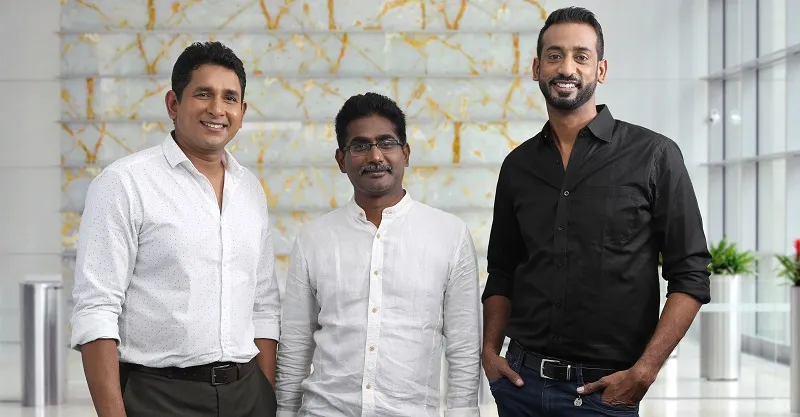Retire the wire: Patented battery tech built by PowerSquare
Three veterans from the software and chip design industry bet on omnipresent wireless chargers and free up people from carrying wired chargers.
Startup: PowerSquare
Founders: Pavan Pudipeddi, Anand Katragadda and Naveen Chava
Year it was founded: 2013
Where is it based: Bengaluru
The problem it solves: Removes the burden of carrying wired chargers and charges new generation smartphone batteries.
Sector: IoT/ battery management systems
Funding raised: $1 million in total from the founders
Expected cost of their wireless battery packs: $100
Imagine a scenario where you are running late for a meeting, and have only 10 percent charge on your phone. You walk up to the nearest coffee shop hoping to find a seat close to a charging point but in vain. A missed meeting, possible loss of business, and the need to make excuses to clients - such is the state of our lives today. With smartphone batteries rarely lasting a day on a full charge, carrying battery packs and chargers has become almost essential.
Now think of this - What if the table you sat at became a charger itself? With electro-magnetic induction, wireless charging has become a reality and your coffee table can indeed become a charger.
Today, wireless charging is available only for expensive phones, but the technology will soon find its way to lower end smartphones too. This will be made possible with the startup called PowerSquare, founded by Pavan Pudipeddi, Anand Katragadda and Naveen Chava.

The three have known each other for the last 25 years, and have worked extensively in the US. Pavan worked in setting up smart battery management systems for top smartphone brands in the market between 2006 and 2012. He realised that wireless charging was the future, and discussed the idea with Anand and Naveen.
The three concluded that in less than a decade, people would not need to carry wired chargers, and that battery chargers would be set up at every place of interaction, the car, the office, a coffee table, and every office lobby. The idea firmly in mind, the three gave up their high-paying jobs in the US and came back to Bengaluru to startup the battery management system company.
“We realised we had the experience to create IP and build a brand,” says Pavan. According to “Verizon Wireless”, wireless chargers emit an alternating magnetic field through the transmitter coil, which in turn induces an alternating voltage/current in the receiver coil inside the device.
The trio started R&D on the product for a B2C and B2B application. In three years, they launched the PowerSquare brand of wireless chargers that are sold in the US and in India. The product is agnostic of all smartphones, and can charge two phones at a time because of the intellectual property of the company. The IP, for which patents have been filed, is in the hardware, the software, the magnetics, and the design that allow multiple phones to be charged.
The business
The company has two products for the B2C market - a wireless charging mat and a power bank. On the B2B side, it wants its chargers to be installed on:
- Conference tables
- Desks and work stations
- Tables in restaurants, coffee shops and waiting areas
- Bar tops
- Corporate boxes and luxury boxes in stadiums
- Furniture designed for the home
- Nearly any non-metallic surface
The company also has an automobile-based device where it will install wireless chargers in cars.
PowerSquare’s B2C business has helped it sell wireless chargers in the US and in India. The company did not want to reveal sales, but the founders have invested close to $1 million to build the business.
The company competes with Mophie, Belkin, Apple and Samsung. The latter two offer wireless chargers that only work with their smart phones. “We have solved two elements in wireless charging, which are multiple devices and freedom of alignment. Now with our future iterations, we will try to solve for distance,” says Pavan.
People talk about powerful batteries when buying a phone, but they come a cropper because they have multiple charging cables at home and the e-waste footprint is only going to go up.
PowerSquare is not your commoditised hardware company, its IP is in the team’s ability to change the way we interact with devices.
Pavan and the team are looking at raising funds soon, and their products are available on Amazon.com and the company's website. Their new set of products will be available starting January 2018. Going forward, they plan to build a B2B practice wherein a device installed under, say, a table could allow a device kept anywhere on it to be charged. To put it simply, the company will go from R&D to commercial mode soon.
“Building a brand and IP out of India is very important,” says Mahesh Lingareddy, Chairman of Smartron.
PowerSquare fits well with the IoT revolution across India.
According to a Nasscom and Deloitte report titled ‘Revolution in the Making’, India will have 1.9 billion IoT devices installed, from the current base of 60 million devices, with a market size of $9 billion. If this “really” happens, India’s installed base will be 10 percent of the total volume of the globe. In terms of market size, India will be 0.40 percent of the total global value of $3 trillion. All these devices need charging and PowerSquare fits well into the whole scheme of things.







